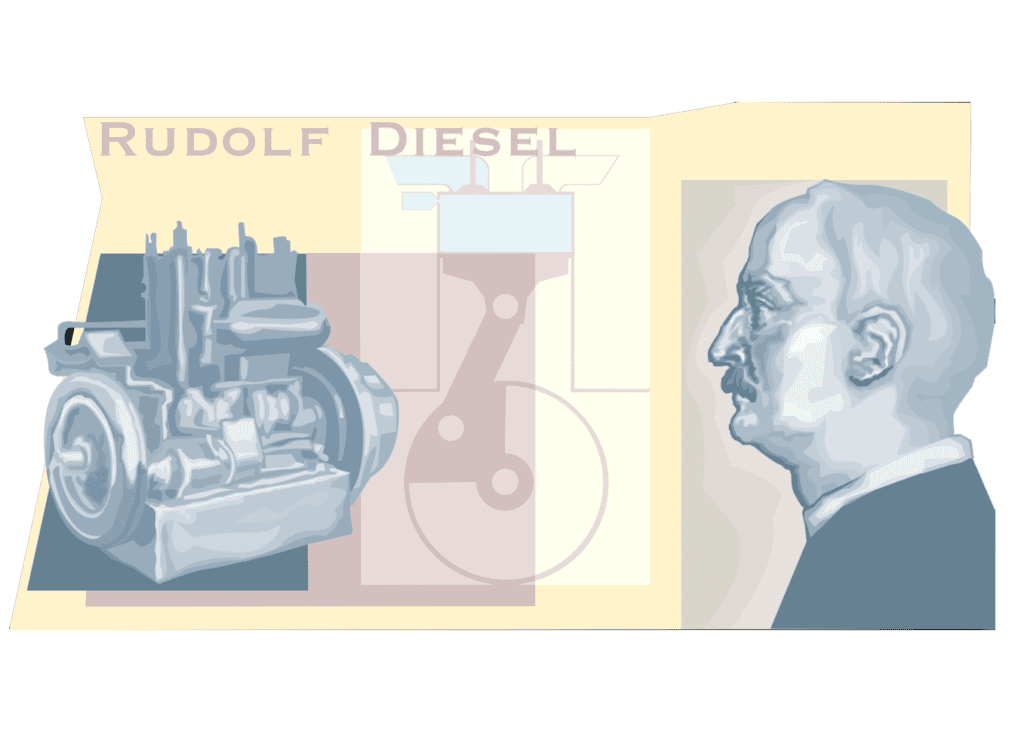We are still discovering novel ways that biodiesel can help reduce our environmental footprint, but the idea of using this alternative fuel is not new. In fact it’s as old as petroleum-powered engines.
Rudolf Diesel, who invented the diesel engine in the 1890s, and ran the demonstrator model with peanut oil, considered plant-based fuel a good alternative, especially in parts of the world where fossil fuels were hard to access, according to Pacific Biodiesel.
“The use of vegetable oils for engine fuels may seem insignificant today, but such oils may become, in the course of time, as important as petroleum and the coal-tar products of the present time,” Diesel said in 1912. In recognition of his early vision, Diesel’s birthday, March 18 (tomorrow), was made National Biodiesel Day.
Of course, awareness of the problem of climate change came after Diesel’s invention, but his idea turned out to be a great solution to that problem: Biodiesel produces fewer greenhouse gases than petroleum-based fuels, it comes from renewable sources, and it can be used in existing diesel engines, according to the Department of Energy’s Alternative Fuels Data Center (AFDC).
Made from a variety of renewable feedstocks
“Biodiesel is a renewable, biodegradable fuel manufactured domestically from vegetable oils, animal fats, or recycled restaurant grease,” according to AFDC. “Biodiesel meets both the biomass-based diesel and overall advanced biofuel requirement of the Renewable Fuel Standard.”
Other feedstocks used to produce biodiesel include algae and even food waste, which may produce competitively priced biodiesel while helping reduce the waste stream. Until recently, food waste could not be processed with hydrothermal technology without an expensive catalyst, according to researchers. But a new innovation, announced in September, involves a less costly catalyst called hydroxyapatite—a mineral occurring naturally in bones—to turn food waste into biodiesel.
“The new technology has the potential to reduce U.S. greenhouse gas emissions by 2.6% while producing renewable diesel with a minimum fuel selling price of $1.06/GGE,” using hydrothermal technology, researchers said. This fuel would be much cheaper than the average of $4.33 that the AAA says is currently charged for a gallon of diesel.
Gevo, a biofuels company and member of the Biotechnology Innovation Organization (BIO), is also using a waste product to make a biodiesel that they say can be cost-competitive with ordinary fossil-fuel diesel.
“Made from a blend of fusel oils (a waste byproduct of fermentation) and isobutanol, Gevo’s renewable diesel has the potential to reinvent the transportation industry, and also has low sulfur content and no particulates,” according to Gevo.
Political backing
Federal subsidies, including incentives in the Inflation Reduction Act, are designed to help biodiesel achieve price parity with regular diesel sooner.
In yesterday’s hearing on the 2024 Farm Bill, Sen. Joni Ernst (R-IA) said the new bill, and the Biden Administration, need to do more to promote bioethanol and biodiesel. “We have this ready-made, available resource and we really feel that it deserves full attention,” she said.
Around the beginning of the war in Ukraine a year ago, Ernst joined Sen. Amy Klobuchar (D-MN) in proposing a bill to increase the use of biofuels as a way to reduce dependency on Russian oil. And other politicians in Iowa, a major corn and biofuel producing state, have echoed that sentiment.
But it’s not just a corn-belt issue. New York last year joined Rhode Island and Connecticut in requiring that heating oil must be blended with biodiesel, in order to reduce air pollution.
The law mandates that heating oil in New York must contain at least 5% biodiesel starting this year, 10% by 2025 and 20% by 2030, Reuters reported. It is projected that it would save about 1 million tons in annual carbon emissions in the state by using biodiesel to replace about 200 million gallons of petroleum-based diesel.
That’s exactly the kind of transition to plant-based oils that Rudolf Diesel imagined more than 100 years ago.
The image of Rudolf Diesel, above, is courtesy of Wannapik.com.




